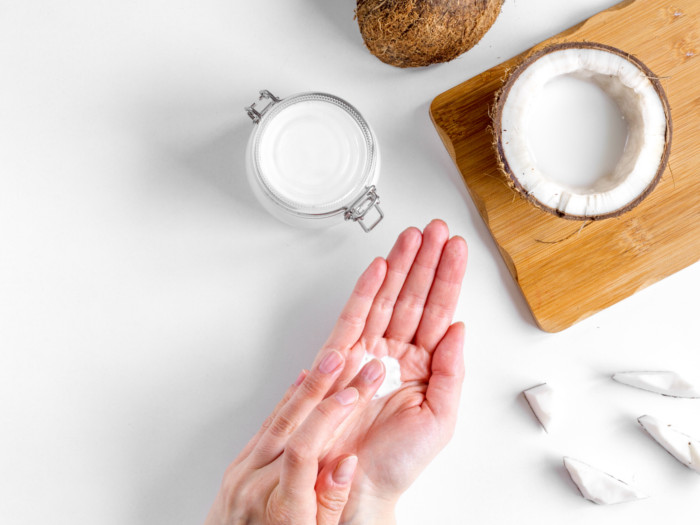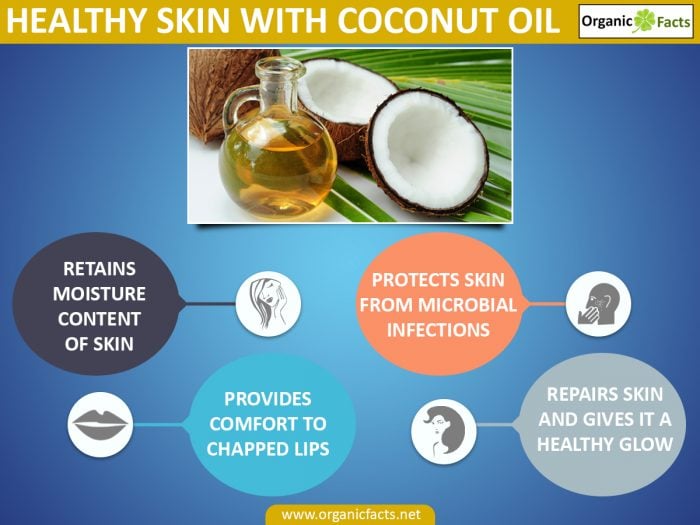Coconut oil is famous throughout the world not only as an edible oil and hair tonic but also as an excellent massage oil and moisturizer for the skin. In tropical countries where coconuts are readily available and used widely, people use coconut oil for skin. They believe that it protects from the sun’s harmful rays. So this natural oil is more effective in protecting the skin in the hottest and sunniest places on earth. It is better than the processed and artificial sun creams that people usually apply. The beneficial effects of the oil are long-lasting. A single application in the morning will last the whole day. Given these various beneficial properties of coconut oil, it is used as an important ingredient in several skin care creams.
Benefits of Coconut Oil for Skin Care
Coconut oil can be used for skin care in the following ways:
| Serving Size : | |
|---|---|
| Nutrient | Value |
| Water [g] | 0.03 |
| Energy | 892 |
| Energy [kJ] | 3730 |
| Total lipid (fat) [g] | 99.06 |
| Ash [g] | 0.03 |
| Calcium, Ca [mg] | 1 |
| Iron, Fe [mg] | 0.05 |
| Zinc, Zn [mg] | 0.02 |
| Choline, total [mg] | 0.3 |
| Vitamin E (alpha-tocopherol) [mg] | 0.11 |
| Tocopherol, beta [mg] | 0.6 |
| Tocopherol, delta [mg] | 0.18 |
| Tocotrienol, alpha [mg] | 2.17 |
| Tocotrienol, beta [mg] | 0.13 |
| Tocotrienol, gamma [mg] | 0.36 |
| Tocotrienol, delta [mg] | 0.25 |
| Vitamin K (phylloquinone) [µg] | 0.6 |
| Fatty acids, total saturated [g] | 82.48 |
| 4:0 [g] | 0.01 |
| 6:0 [g] | 0.48 |
| 8:0 [g] | 6.8 |
| 10:0 [g] | 5.39 |
| 12:0 [g] | 41.84 |
| 14:0 [g] | 16.65 |
| 15:0 [g] | 0.02 |
| 16:0 [g] | 8.64 |
| 17:0 [g] | 0.01 |
| 18:0 [g] | 2.52 |
| 20:0 [g] | 0.08 |
| 22:0 [g] | 0.02 |
| 24:0 [g] | 0.03 |
| Fatty acids, total monounsaturated [g] | 6.33 |
| 16:1 [g] | 0.02 |
| 16:1 c [g] | 0.02 |
| 18:1 [g] | 6.27 |
| 18:1 c [g] | 6.25 |
| 20:1 [g] | 0.04 |
| Fatty acids, total polyunsaturated [g] | 1.7 |
| 18:2 [g] | 1.68 |
| 18:2 n-6 c,c [g] | 1.68 |
| 18:3 [g] | 0.02 |
| 18:3 n-3 c,c,c (ALA) [g] | 0.02 |
| Fatty acids, total trans [g] | 0.03 |
| Fatty acids, total trans-monoenoic [g] | 0.02 |
| 18:1 t [g] | 0.02 |
| 18:2 t not further defined [g] | 0.01 |
| Fatty acids, total trans-polyenoic [g] | 0.01 |
| Phytosterols [mg] | 86 |
| Sources include : USDA [1] | |
Lip Gel
Cracks in our lips can be a source of worry, discomfort, and embarrassment. Applying chemical gel to the lips can result in you consuming some of the gel inadvertently, even though it is toxic. Some types of gels are edible, but you still don’t want to eat those chemicals. Coconut oil comes as an ideal alternative in such cases. It acts quickly and even if it consumed, it will only give you additional benefits.
Skin Softener
Coconut oil is a great skin softener and helps you do away with dry, hard skin conditions. Simply take some coconut oil on your palms, rub your palms against each other once or twice and then on your face, hands or wherever you want to see the moisturizing effect. [2]
Coconut oil is also good for hardened and cracked feet, which may happen due to excessive cold or strenuous work that requires standing for long durations. The cracks in your feet will not vanish, but your feet will become softer within days if you apply coconut oil to the affected area.
As an exfoliant, including coconut oil with other exfoliating or grainy materials like salt and sugar, can vastly improve the effects. You can scrape off excess dead skin and clean out substances that block pores without leaving the skin feeling irritated. The soothing nature of the oil combines with the grainy, exfoliating material perfectly, and leaves your skin with an even color, closed pores, and a soft texture. [3]
Makeup Remover
Coconut oil can be used as a makeup remover. Although uncommon, women around the world have begun using it for removing their makeup, without worrying about the harsh chemicals that other removers contain. These chemicals can enter into delicate or sensitive areas. [4]

Coconut oil is composed of nourishing fatty acids. Photo Credit: Shutterstock
Skin Disorders
As per the USDA, coconut oil contains vitamin E that helps improve skin health. It is claimed that coconut oil is good for several skin disorders such as acne, psoriasis, and eczema. However, scientific research is ongoing to prove or deny these claims. Much of the research speaks of its protein content since it helps in the replacement of sick or dying cells that can occur with various skin disorders. These are quickly replaced by new, healthy cells. So, coconut oil not only treats the infection by battling the microbial bodies, but it also heals skin damage or visible marks. It is a two-in-one solution! [5] [6]
Anti-aging Cream
Traditionally, coconut oil has been praised and popularized for its anti-aging properties. A 2018 article published in the journal Cosmetics, compared different oils for their anti-aging effect. The anti-aging properties of coconut oil were attributed to its ability to reduce water loss from the skin. Other potential anti-aging properties included emollient, anti-inflammatory, humectant, wound healing, antioxidant, and the ability to increases collagen. [7]
How to use coconut oil for skincare?
If you have never used coconut oil for skincare before, here is a brief guide:
- When buying coconut oil, look for jarred products with a broad opening. Coconut oil solidifies in colder climates, like a cream. To liquify, all you have to do is apply gentle heat.
- Take some coconut oil, either solid or liquid, on your palm. Then, rub your palms together and onto the skin of the desired area. You can also put coconut oil on a piece of cotton and rub it onto your skin.
- However, it is not necessary to reapply coconut oil as often as other natural skincare oils. You only need a small amount to create a protective shield on your skin and it will last for the whole day.
Many people make the mistake of using too much coconut oil, and since the skin can only absorb a certain amount, the protective layer that the absorbed oil creates doesn’t let any more oil in. This means that if you use too much, too often, your skin will end up as an oily mess, and will look shiny or greasy, not to mention what it might do to your clothes.
The question is, what makes coconut oil so beneficial for the skin? Before we can understand how coconut oil achieves all of its impressive benefits, let’s look into the constituents of coconut oil and the respective properties that make them useful for maintaining skin health.
Coconut Oil- Composition
- Saturated Fats: Saturated fats found in coconut oil are predominantly medium-chain fatty acids or triglycerides. When applied to the skin, they keep it smooth to the touch. Due to the presence of these fats, coconut oil also retains the moisture content of the skin, as the fats eliminate moisture loss through the pores of the skin. When ingested regularly, these fats deposit under the skin. They keep it healthy and smooth, giving it an even tone and reducing the appearance of pores. [8]

Virgin coconut oil is very helpful for skin care. Photo Credit: Shutterstock
- Capric/Caprylic/Lauric acid: These are not very different from the medium-chain fatty acids. These three fatty acids have strong disinfectant and antimicrobial properties. As a result, when applied to the skin, coconut oil protects from microbial infections that can get into open wounds or even enter the body through the pores. This microbial action can be experienced even if coconut oil is taken internally, as the fatty acids boost the immunity when converted to monocaprin and monolaurin. Furthermore, capric, caprylic, and lauric acids are easily broken down into chains of fatty acids. This means they contribute to usable energy in quick and efficient ways. This can be a major boost to your energy levels before a workout, which is why these powerful acids have also been linked to weight loss and weight management. Losing weight is a good way to improve the quality of your skin, reducing excess fat, stretch marks, and folds in the skin. Having a healthy, toned body means that the skin maintains its tight grip on the muscles and bones. [9] [10]
- Vitamin E: The contribution of vitamin E towards skincare is well known. It is essential for healthy skin, keeping the skin smooth, and protecting it against cracking. Above all, its antioxidant properties prevent premature aging and wrinkling of the skin. One hundred grams of coconut oil has about 0.1 mg of vitamin E, thus enhancing its skin-nourishing properties. [11]
- Proteins: Like coconuts themselves, coconut oil is rich in many proteins. These proteins keep skin healthy and rejuvenated, both internally and externally. Proteins also contribute to cellular health and tissue repair, along with a wide range of other essential activities within the body. For any damaged cells on or near the skin, a healthy flow of proteins guarantees their replacement at a normal rate. People with protein-deficient diets heal slower and often develop more scars due to the extended healing time.
So, go get yourself some coconut oil and bring your skin back to its natural beauty.
